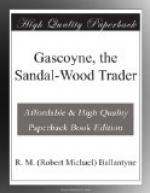Never before had the missionary secured such an opportunity. His eccentric method of obtaining a hearing had succeeded beyond his expectations. With a heart overflowing with gratitude to God, he stood up and began to preach the gospel.
Mr. Mason was not only eccentric, but able and wise. He made the most of his opportunity. He gave them a very long sermon that day; but he knew that the savages were not used to sermons, and that they would not think it long. His text was a double one,—“The soul that sinneth it shall die,” and “Believe on the Lord Jesus Christ, and thou shalt be saved.”
He preached that day as a man might who speaks to his hearers for the first and last time, and, in telling of the goodness, the mercy, and the love of God, the bitter grief of his own heart was sensibly abated.
After his discourse was over and prayer had been offered up, the savage warriors were silently formed into a band and marched off in front of the Christians to the spot where Mr. Mason had promised to set them free. They showed no disinclination to go. They believed in the good faith of their captors. The missionary had, indeed, got them into his power that day. Some of them he had secured forever.
CHAPTER XIX.
SORROW AND SYMPATHY—THE WIDOW BECOMES A PLEADER AND HER SON ENGAGES IN A SINGLE COMBAT.
There are times in the life of every one when the heart seems unable to bear the load of sorrow and suffering that is laid upon it,—times when the anguish of the soul is such that the fair world around seems enshrouded with gloom, when the bright sun itself appears to shine in mockery, and when the smitten heart refuses to be comforted.
Such a time was it with poor Frederick Mason when, after his return to Sandy Cove, he stood alone, amid the blackened ruins of his former home, gazing at the spot which he knew, from the charred remnants as well as its position, was the site of the room which had once been occupied by his lost child.
It was night when he stood there. The silence was profound, for the people of the settlement sympathized so deeply with their beloved pastor’s grief that even the ordinary hum of life appeared to be hushed, except now and then when a low wail would break out and float away on the night wind. These sounds of woe were full of meaning. They told that there were other mourners there that night,—that the recent battle had not been fought without producing some of the usual bitter fruits of war. Beloved, but dead and mangled forms, lay in more than one hut in Sandy Cove.
Motionless, hopeless, the missionary stood amid the charred beams and ashes, until the words “Call upon me in the day of trouble and I will deliver thee, and thou shalt glorify me,” descended on his soul like sunshine upon ice. A suppressed cry burst from his lips, and, falling on his knees, he poured forth his soul in prayer.




